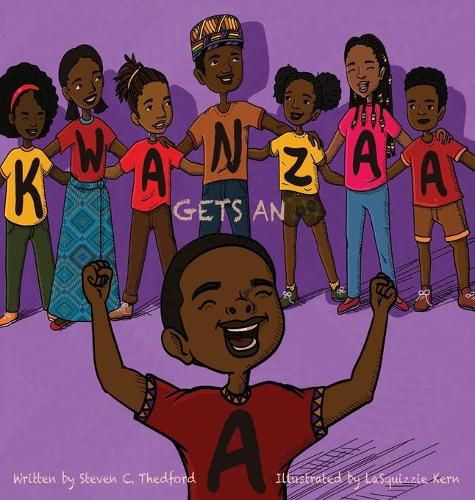Readings Newsletter
Become a Readings Member to make your shopping experience even easier.
Sign in or sign up for free!
You’re not far away from qualifying for FREE standard shipping within Australia
You’ve qualified for FREE standard shipping within Australia
The cart is loading…






This title is printed to order. This book may have been self-published. If so, we cannot guarantee the quality of the content. In the main most books will have gone through the editing process however some may not. We therefore suggest that you be aware of this before ordering this book. If in doubt check either the author or publisher’s details as we are unable to accept any returns unless they are faulty. Please contact us if you have any questions.
The African American Holiday of Kwanzaa derives its name from the lingua franca of East Africa, Swahili. Additionally, the names and principles of the holiday are also derived from the language. Many people believe that Dr. Karenga chose Swahili because it is the largest language spoken by Africans across the continent. Moreover, Kwanzaa derived its name from the phrase matunda ya kwanza ( first fruits ). Yet, as you may have noticed, Kwanza has only one a in the expression, but the Kwanzaa that is celebrated by millions of people has two A’s. Why is that so?
Well, you’ll get many answers if you read books about Kwanzaa. For example, in James C. Anyke’s book African American Holidays, he states that the extra a was added to distinguish this celebration as an African American Holiday. Furthermore, The Children’s Book of Kwanzaa by Dolores Johnson elucidates that the extra ‘a’ was added to give the holiday greater significance. After reading and analyzing several different explanations, I decided to directly approach the source. Therefore, I reviewed the books written by Dr. Karenga on the origins of Kwanzaa. According to those sources, I discovered that the extra a was attributed to the fact that Dr. Karenga wanted all seven children present at the first Kwanzaa to participate in the program.
Moreover, uncovering these facts inspired me to write a picture book: Kwanzaa Gets an A. Using Dr. Karenga’s book as a guide, Kwanzaa Gets An A narrates the story about the manner in which the name of the holiday came into existence using a griot, an African storyteller. Consequently, the book was written to be an interactive experience where children participate, call and respond. Put succinctly, as the griot tells the story of Kwanzaa Gets an A, the children respond Ashe (ah-Shay), a West African word that means to bring about change.
$9.00 standard shipping within Australia
FREE standard shipping within Australia for orders over $100.00
Express & International shipping calculated at checkout
This title is printed to order. This book may have been self-published. If so, we cannot guarantee the quality of the content. In the main most books will have gone through the editing process however some may not. We therefore suggest that you be aware of this before ordering this book. If in doubt check either the author or publisher’s details as we are unable to accept any returns unless they are faulty. Please contact us if you have any questions.
The African American Holiday of Kwanzaa derives its name from the lingua franca of East Africa, Swahili. Additionally, the names and principles of the holiday are also derived from the language. Many people believe that Dr. Karenga chose Swahili because it is the largest language spoken by Africans across the continent. Moreover, Kwanzaa derived its name from the phrase matunda ya kwanza ( first fruits ). Yet, as you may have noticed, Kwanza has only one a in the expression, but the Kwanzaa that is celebrated by millions of people has two A’s. Why is that so?
Well, you’ll get many answers if you read books about Kwanzaa. For example, in James C. Anyke’s book African American Holidays, he states that the extra a was added to distinguish this celebration as an African American Holiday. Furthermore, The Children’s Book of Kwanzaa by Dolores Johnson elucidates that the extra ‘a’ was added to give the holiday greater significance. After reading and analyzing several different explanations, I decided to directly approach the source. Therefore, I reviewed the books written by Dr. Karenga on the origins of Kwanzaa. According to those sources, I discovered that the extra a was attributed to the fact that Dr. Karenga wanted all seven children present at the first Kwanzaa to participate in the program.
Moreover, uncovering these facts inspired me to write a picture book: Kwanzaa Gets an A. Using Dr. Karenga’s book as a guide, Kwanzaa Gets An A narrates the story about the manner in which the name of the holiday came into existence using a griot, an African storyteller. Consequently, the book was written to be an interactive experience where children participate, call and respond. Put succinctly, as the griot tells the story of Kwanzaa Gets an A, the children respond Ashe (ah-Shay), a West African word that means to bring about change.